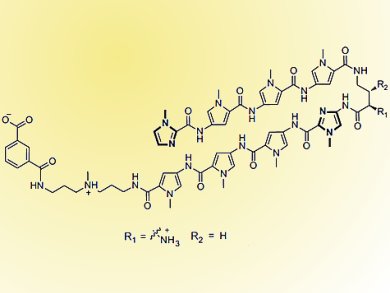The conversion of DNA into RNA (transcription) is a necessary step for protein synthesis. Since cancer cells’ survival is highly dependent on this process, compounds blocking transcription effectively kill tumor cells. These drugs, however, damage the DNA in a non specific manner. As a consequence, they affect healthy cells and provoke severe secondary effects.
According to Fei Yang, California Institute of Technology, USA, and colleagues, this problem can be circumvented using hairpin pyrrole-imidazole polyamides, synthetic cell-permeable DNA-binding molecules. The researchers demonstrated that polyamide 1 (pictured) blocks transcription without causing a DNA damage as it degrades the largest subunit of the RNA polymerase II (RNAP2), the enzyme converting DNA into RNA. Thus, when administered to cancer bearing mice, the drug reduced the tumoral growth without exerting toxic effects on health tissues.
- Antitumor activity of a pyrrole-imidazole polyamide,
F. Yang, N. G. Nickols, B. C. Li, G. K. Marinov, J. W. Said, P. B. Dervan,
Proc. Nat. Acad. Sci. 2013.
DOI: 10.1073/pnas.1222035110




